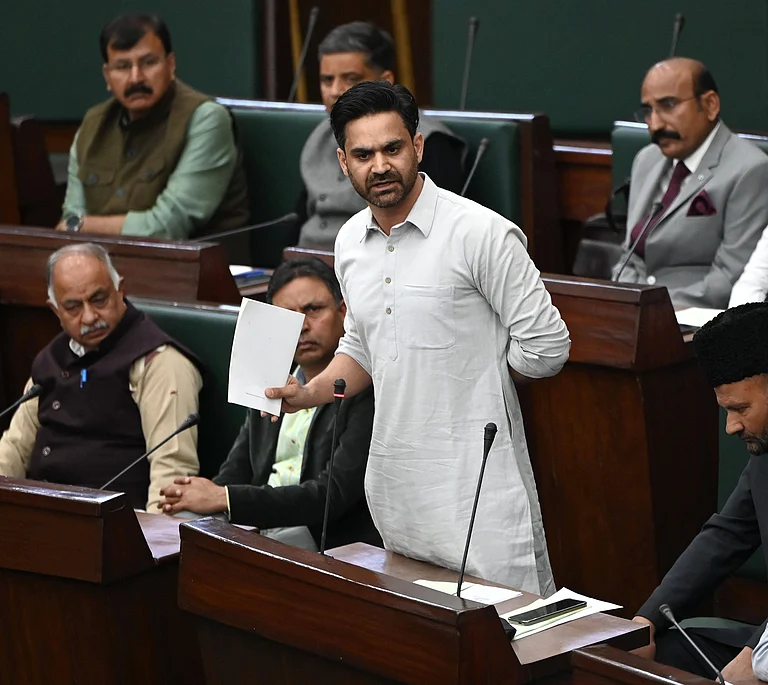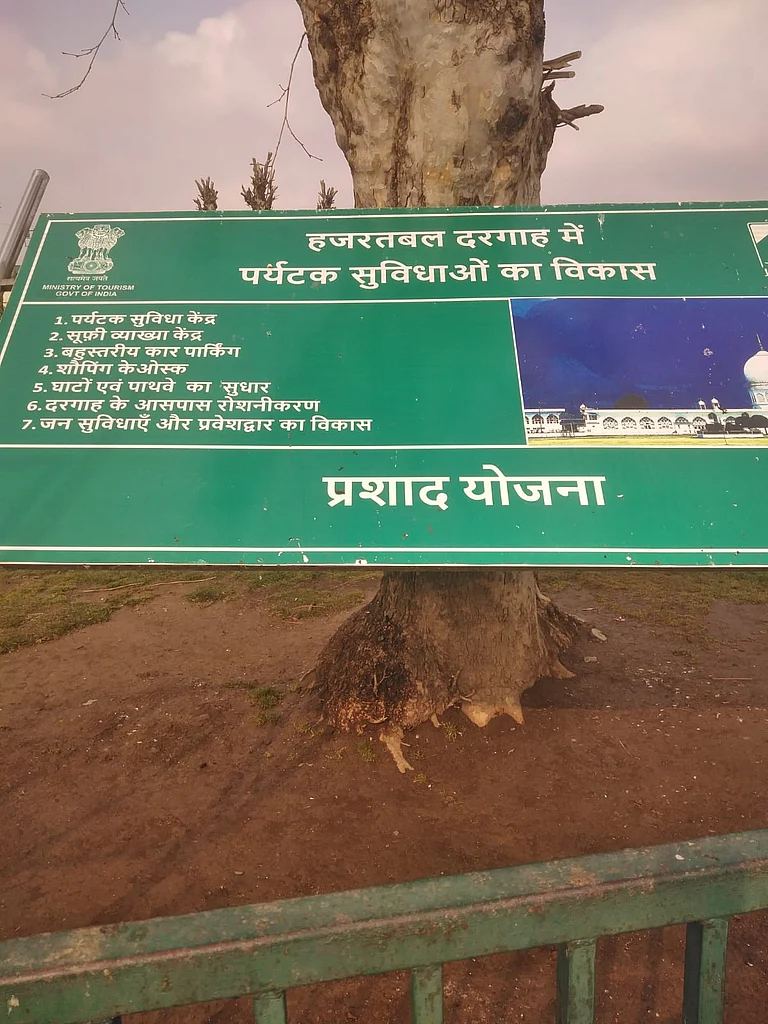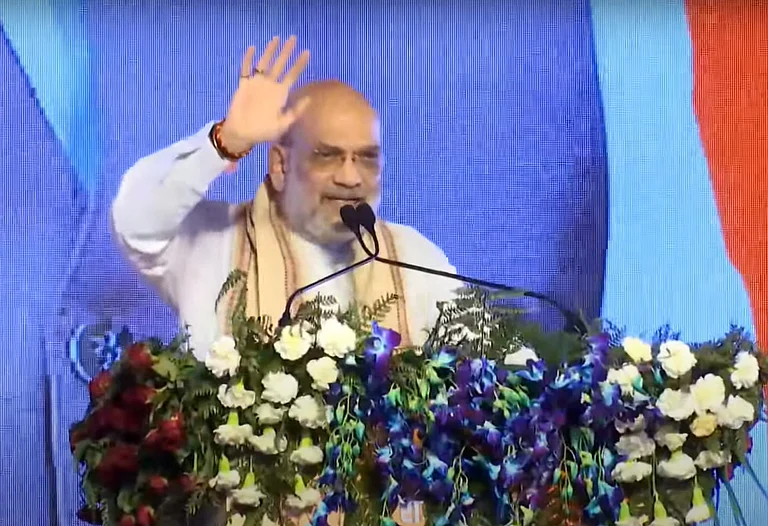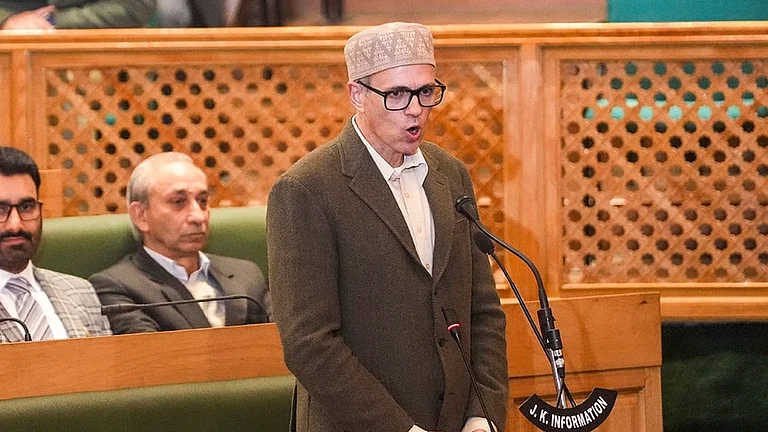Outside the Bharatiya Janata Party’s (BJP) office in the high-security upscale area of Jawahar Nagar, there is no line of visitors. Security guards inspect each person at the entrance―visitors have to retain their ID cards until they leave. The area is further secured by a bunker and concertina wire along the office wall, with security personnel in the bunker monitoring every movement. Across the road, in the park directly in front of the office, children play while security forces―some sitting and others standing―maintain a vigilant watch over the surroundings.
Inside the party office, in the first room, BJP leaders were sitting on sofas, engaged in their routine discussions about daily activities. Senior leader and party spokesman, Altaf Thakur, 46, along with another senior leader, Ali Mohammad Mir, 56, and other party workers, were deliberating on party matters. Mir has been with the BJP since 1995, during the height of militancy, while Thakur joined the party in 2004.
“We had a small office opposite the Hurriyat Conference office at Rajbagh. Back then, no one was sure about the future of the BJP in Kashmir but look at the situation now. We have a membership of 7.5 lakh people in Kashmir, and the Hurriyat is nowhere,” says Mir. “It has been a long and tough journey,” he adds.
Thakur, smiling and dressed in a white kurta pyjama, leads the conversation. “There were times when we were arrested and handcuffed for trying to hoist the Tricolor at Lal Chowk,” he says.
He says the biggest achievement of the BJP after the abrogation of Article 370 is that two former chief ministers and dynasties have lost the elections. The defeat of Omar Abdullah and Mehbooba Mufti is a new dawn in Kashmiri politics and Engineer Rashid’s win signifies the new politics. Rashid’s win is a big change,” says Thakur.
He says in parliamentary elections, people in North Kashmir had only one option other than dynastic parties and voted for the alternative. “I don’t refer to Rashid’s win as a win for secessionist politics. It can be said he got sympathy votes,” he says.
From North Kashmir’s Lok Sabha seat, Rashid got 472,481 votes, defeating Abdullah, who secured 268,339 votes, and Sajad Lone, who received 173,239 votes. Rashid―who has been in jail for the past five years facing money laundering charges, which he denies―led an emotional and vigorous campaign across the 18 assembly segments of North Kashmir, using social media extensively. Rashid’s victory was spearheaded by his 23-year-old son, Abrar Rashid. His powerful slogan, “Jail ka badla vote se” (revenge of jail with vote) resonated with people as hundreds of people are in jails. The two regional parties, the National Conference and the People’s Democratic Party (PDP), however, describe Rashid’s win as a triumph of separatist politics and a rejection of New Delhi’s policies implemented in Jammu and Kashmir after the abrogation.
While the BJP takes credit for the peace in Kashmir, it is also surprised over the resurgence of militancy in the Jammu region. “I will tell you what has changed after the abrogation of Article 370. There is nightlife in Kashmir. People are happy. There is no stone pelting. There are no strike calls from separatists. Till June, 1.10 crore tourists visited Kashmir,” says Thakur.
“In Kashmir, Prime Minister Narendra Modi has left no option without mainstream politics. That’s why today Jamaat-e-Islami is keen to participate in the elections,” he says. “Yes, sakti (restriction) is in place and it should continue. But you can also see its benefits. There are no civilian killings. There is a happy life,” he says.
The BJP leaders say that after 2019, the BJP’s membership in Kashmir has increased, and it is now around one million. However, the party leaders are not able to answer why the party didn’t contest elections for the Lok Sabha from the three seats of Kashmir if the party’s membership has increased.
“The decision to not contest polls was taken by the party high command and we abide by it,” Mir intervenes. He says the party took the decision to support the Jammu and Kashmir People’s Conference (PC) and the Jammu and Kashmir Apni Party as they became a part of the National Democratic Alliance (NDA).
“Except Nehru-Gandhi, Abdullahs and Muftis, we were mandated to support other parties, whether it was the Apni Party or the PC,” the party leaders say.
Regarding the surge in militancy in the region, where militant attacks and encounters are taking place regularly, the party leaders argue that most of the deployment of the Army and other security forces were in Kashmir after the abrogation. “Because of this, there is intense pressure on the militants. No militant can survive in Kashmir. That is the reason militancy has now shifted to the Jammu region,” says Thakur.
He says that in the Jammu region, militancy has spread to the Hindu-dominated areas, and the militants are spreading terror deliberately to create a gap between the Hindus and the Muslims in the Jammu region.
“The militants are adopting the hit-and-run policy in the Jammu, but it will end soon,” says Thakur. “Now Pakistan has embraced its earlier policy to have Kashmir in Jammu, but they won’t succeed,” he adds.
Since October 11, 2021, when five army soldiers, including a JCO, were killed in an encounter with the militants in the Chamrer forests of Surankote tehsil of Poonch district in Jammu, a region that has witnessed a steep rise in militant attacks recently.
Since June 9 this year, when Modi was about to take the oath of office for the third time, militants attacked a bus carrying pilgrims in the Reasi area of Jammu. The attack killed nine pilgrims and wounded 31 others. Local BJP leader Shamsher Singh told Outlook in Ransoo, where the incident took place, “Had the driver stopped the bus, the terrorists would have killed all the pilgrims.” He adds that such incidents have instilled fear across the Jammu region.
In 2020, while Kashmir witnessed regular gunfights between the security forces and local militants, Jammu remained largely peaceful. In December 2020, the Jammu and Kashmir Police reported a decrease in militancy incidents, infiltration, and civilian killings. In an annual briefing, the police, in December 2020, stated that security forces conducted over “100 successful counter-terrorism operations, killing 225 terrorists” with 207 of them killed in Kashmir.
In 2020, China escalated tensions along the Line of Actual Control (LAC) in Ladakh leading to deadly fighting in the Galwan Valley, considered the most significant border escalation in over four decades. The Ladakh situation prompted the army to move two divisions from Jammu to Ladakh.
Now to make counterinsurgency operations in Jammu strong, a brigade-level force has been deployed, including three battalions of an infantry brigade (3,000 troops) and several special forces teams (500 troops). These are apart from the existing units such as the Romeo and Delta units of the Rashtriya Rifles (RR) and the 25 and 26 Infantry Divisions. Two Border Security Force (BSF) battalions, comprising over 2,000 personnel, have been relocated from anti-Naxal operations in Odisha to the Samba sector in Jammu.
Defence expert Lt General (retd) Syed Ata Hasnain tells Outlook that for many years, Pakistan concentrated on Kashmir because that is where its focus always was. “With all networks effectively neutralised in Kashmir by Indian security forces and intelligence agencies after 2019, Pakistan was losing its relevance as a stakeholder. Lack of terrorist activity and low levels of violence would mean Pakistan’s ability to demonstrate its hold over Jammu and Kashmir would be questionable,” he adds.
“It has invested too much in 35 years to become irrelevant now. It has found the CT grid in the Pir Panjal South less effective than Pir Panjal North. Recent strikes seem to indicate depth areas between Kathua and Doda as targets. The Army presence is relatively less there and it is easier to carry out clandestine operations with impunity in such areas. Also, infiltration through the IB sector is easier than the Valley sector,” says Gen Hasnain, who commanded the Indian Army’s 15 Corps in Jammu and Kashmir.
Asked whether the attacks in Jammu were linked with the tension along the LAC between India and China in the Ladakh region, he says, “I do not perceive this to be linked with the Chinese threat in Ladakh or elsewhere. However, the intent is definitely to make us defensive, force deployment of more troops on protection duties, tire out all security forces and project Pakistan’s abiding relevance.”
While General Hasnian calls for holding assembly elections with full determination, arguing that Pakistan and separatists intend to push back the assembly elections by creating a fear psychosis, the BJP, at least in Kashmir, also has the same view. “The elections will be held in September and the BJP will contest from all seats in Jammu and Kashmir,” says Thakur. He says the government has planned for massive investment in Jammu and Kashmir, and so far, malls have been constructed by investors from Dubai. On the return of Kashmiri Pandits, the BJP leaders say they don’t have any data. “Some have returned, but we don’t have any data available with us,” says Thakur.
As the Election Commission of India (ECI), led by Chief Election Commissioner (CEC) Rajiv Kumar, will visit Jammu and Kashmir from August 8-10 to review the preparedness for the upcoming assembly elections, the challenge for the ECI is announcing the elections. While the BJP is confident that assembly elections will be held, other political parties doubt the BJP’s intention, accusing the party of delaying the polls for the past eight years.
In March 2024, the CEC, during his visit to Jammu and Kashmir before the announcement of the Lok Sabha elections, had assured political parties and the people of Jammu and Kashmir that the ECI would soon hold the assembly elections. It remains to be seen whether an announcement would be made as the Supreme Court has given a deadline of September 2024 to hold elections.
Unlike the BJP, the National Conference office at Nawai Subha is buzzing with people coming to meet party leaders. The party general secretary Ali Mohammad Sagar, who was sitting with some party leaders, says the National Conference will soon come up with its manifesto. “It will have all the details about the party’s future political strategy,” he says.
Imran Nabi Dar, the party spokesman, says the BJP and the Union government have offered nothing to Jammu and Kashmir after the abrogation of Article 370. “They promised 50,000 jobs, but didn’t provide any. Now they are taking away our jobs. This week, they dismissed five people from government services. We see government employees being dismissed without following any legal due process,” he adds.
“We have not seen any investment in Kashmir. Instead, public money is being wasted. Take the Srinagar Smart City project: instead of easing life for the people, it has made it more difficult. They have dug up the whole city. Flooding happens ever if there is rain for one day,” he says. Dar believes an elected government should investigate the Smart City project.
“No big corporate houses are investing in Kashmir. Instead, land is being given to the state government to build structures. This is problematic because once the state governments build structures on these lands tourists will stay in these buildings, instead of hotels, squeezing the tourism potential of Kashmir. Our minerals are put to auction by the government, but there are no buyers. This is your investment,” he adds.
However, Dar says sarcastically that there has been a growth in the number of wine shops. “The BJP believes that having wine shops in Kashmir is part of the Nasha Mukt Bharat Abhiyaan,” he adds. He criticises the BJP for using the return of Kashmiri Pandits as an argument to abrogate Article 370. “The opposite is happening. There have been instances of migration of some Kashmiri Pandit families after the targeted killings. Pandits have been used as a vote bank by the BJP, and they now realise it and are openly criticising the government.” “Look at the Pandit organisations and their statements; it’s a telling indictment of the BJP.”
Despite the Nation Conference vice president’s loss in North Kashmir, Dar says that the party got the highest cumulative vote share in the general elections. “We got a cumulative 11.46 lakh votes in Kashmir. In contrast, the BJP couldn’t find a candidate to fight. I agree the loss in north Kashmir was unexpected. People made a choice, and the north Kashmir vote was emotional.”
“The high voting percentage in the general elections is a form of revenge by the people to show the BJP its worth. The BJP didn’t get any votes. The parties supported by the BJP even lost their bail bonds. This is the people’s way of expressing their dissatisfaction with the BJP’s actions in Kashmir,” says Dar.
“The National Conference will come back in a big way not only in North Kashmir but in the whole of Jammu and Kashmir. You’ll see this in the assembly elections,” he says.




























